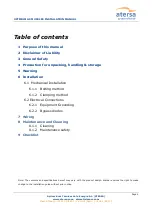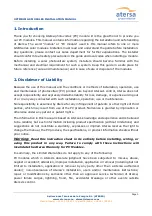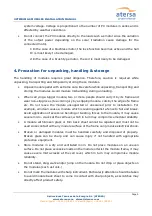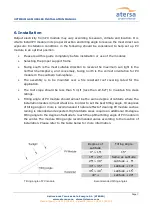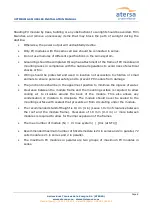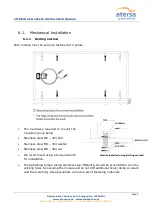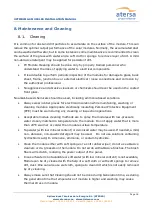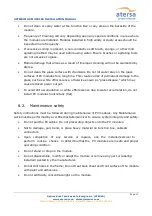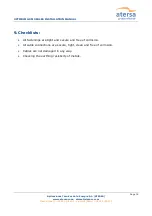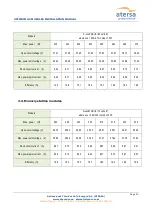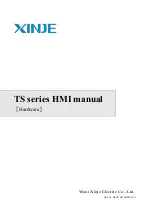
OPTIMUM GS MODULES INSTALLATION MANUAL
Page 5
Aplicaciones Técnicas de la Energía S.L. (ATERSA)
www.atersa.com – atersa@elecnor.com
Madrid (Spain) +34 915 178 452 - Valencia (Spain) +34 961 038 430
system voltage. Voltage is proportional to the number of PV modules in series and is
affected by weather conditions.
•
Do not connect the PV modules directly to the loads such as motor since the variation
of the output power depending on the solar irradiation cause damage for the
connected motor.
1:In the case of a blushless motor, the lock function becomes active and the hall
IC is most likely to be damaged.
2:In the case of a brush type motor, the coil is most likely to be damaged.
4.
Precaution for unpacking, handling & storage
The handling of modules requires great diligence. Therefore, caution is required while
unpacking, transporting and temporarily storing these modules.
•
Unpack module pallet with extreme care. Be careful while unpacking, transporting and
storing the modules. Avoid module mishandling during unloading.
•
When carrying a bigger module, two or more people should carry it by its frame and
wear non-slip gloves (to avoid injury by a slipping module, cuts by the edge of a frame
etc. Do not leave the module unsupported or unsecured prior to installation. For
example, wind can cause a module which is leaning against a fence to fall and break.
Avoid application of excessive bending or twisting forces to the module, it may cause
severe micro- cracks at the cell level, which in turn may compromise module reliability.
•
A module with broken glass or torn back sheet cannot be repaired and must not be
used since contact with any module surface or the frame can produce electrical shock.
•
Broken or damaged modules must be handled carefully and disposed of properly.
Broken glass can be sharp and can cause injury if not handled with appropriate
protective equipment.
•
Store modules in a dry and ventilated room. Do not place modules on an uneven
surface .Do not place excessive loads on the module or twist the module frame, it may
cause severe micro-cracks at the cell level, which in turn may compromise module
reliability.
•
Do not stand, step, walk and/or jump on the module. Do not drop or place objects on
the modules (such as tools.)
•
Do not mark the modules with sharp instrument. Particularly attention should be taken
to avoid module back sheet to come in contact with sharp objects, as scratches may
directly affect product safety.


